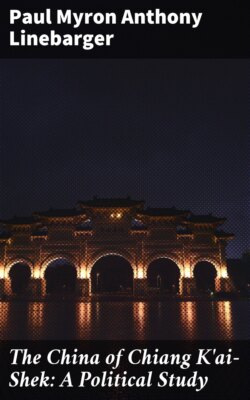Читать книгу The China of Chiang K'ai-Shek: A Political Study - Paul Myron Anthony Linebarger - Страница 19
На сайте Литреса книга снята с продажи.
The Council of State
ОглавлениеTable of Contents
The Council of State (Kuo-min Chêng-fu Wei-yüan-hui, National Government Committee) is the formal governmental core of the Chinese Republic. Even in peacetime, however, its importance was seriously undermined by the vigorous activity of the Central Political Council. The members of the State Council are commonly persons who do not hold other important office; hence the Council does not include the most effective leaders. Although its sphere of activity is wide, its role as ratifier of the decisions of the Supreme National Defense Council reduces its plenary powers to a shadow. Amnesties, general appropriation bills, appointments and removals, solemnification of legislation adopted by the Legislative Yüan, and inter-Yüan problems are all within the scope of the State Council's authority, but except for the power of organizing and supervising the central independent agencies, subordinate only to itself, there has been little practical power for it to exercise.[12]
The independent agencies under the Council of State, together with the latter's relation to the Yüan and the Military Affairs Commission, are best shown on the chart on p. 55.[13]
Minor agencies are thus attached directly to the Council of State, which also serves as a link and common formal superior to the five Yüan and the Military Affairs Commission. Authority of the Council is directed primarily upon these agencies which, while minor, serve useful needs. The Offices of Military (Tsan-chün Ch'u) and of Civil Affairs (Wên-kuan Ch'u) are transmission and ceremonial agencies, charged with the formal correctness of state documents and ceremonies; the military office was originally designed to carry on more important functions, including an independent inspectorate of troops, but now seems to be restricted to matters of protocol. Chinese government has for centuries operated on the basis of a two-way current of written materials: memorials, petitions, and other communications come from the provinces and dominions to the metropolis; orders, laws and other commands flow outward in response.[14]
The other four agencies directly dependent on the Council of State are all of important character, but likely to be impaired by a period of crisis. The Academia Sinica (Kuo-li Chung-yang Yen-chiu Yüan) serves scientific and educational work through its own research bureaus, through systems of extended aid, and through a program of publications; despite war, it has continued, making heroic efforts to preserve the national cultural vitality and continuity. The three remaining agencies are of less importance, although the Planning Committee for the Western Capital (Hsi-ching Ch'ou-pei Wei-yüan-hui) found its work considerably extended when, on October 1, 1940, Chungking was formally denominated an auxiliary capital of the Chinese Republic, and a long-standing anomaly—that of the city's uncertain status—was removed.
The Council of State could be regarded, therefore, as a mere excrescence upon the design of government were it not that ceremonial and formal functions, indispensable to any government but particularly salient in China, can be delegated to it, and the actual policy-making agencies thereby stripped down to maximal utility and efficacy.
